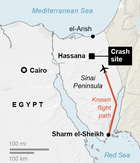CAIRO -- Egypt said Monday that it has not yet found any sign of terrorism in the Oct. 31 crash of a Russian passenger jet in the Sinai desert, a preliminary finding that conflicts with statements of Russia, the U.S. and Britain that they believed a bomb was to blame.
The Egyptian statement reflected the reluctance among government authorities to point to the possibility of a bomb.
The Metrojet Airbus A321-200 broke apart 23 minutes after departing the Red Sea resort of Sharm el-Sheikh for St. Petersburg, Russia, killing all 224 people aboard. The crash led Russia to halt all flights to and from Egypt, while Britain suspended flights to and from the resort.
Several officials involved in Egypt's investigation said finding a culprit was difficult because of security gaps at the Sharm el-Sheikh airport, including poor video surveillance and the number of people who could enter the facility with only limited searches.
Soon after the crash, the U.S. and Britain said the plane probably was brought down by a bomb, in part citing chatter among militants in Sinai. On Nov. 17, Russia also announced a bomb was to blame, saying its tests had founds traces of TNT on luggage, personal effects and fragments of the plane. In response, Egyptian Prime Minister Sherif Ismail said his country would "bear in mind" the Russian conclusion.
A local affiliate of the Islamic State group claimed responsibility and released a photo of what it said was the bomb used to bring the plane down -- a soft-drink can packed with explosives and wires that appeared to be a kind of detonator.
The head of Egypt's main investigation, run by the Civil Aviation Ministry, said its inquiry so far has found no evidence of any "illegal or terrorist act." Its preliminary report has been given to other countries involved, and it is continuing its work, said chief investigator Ayman el-Muqadam.
He also complained that the countries contending a bomb was to blame have not given his investigators "any information indicating unlawful interference" with the plane.
The ministry-led investigation, in which Russia and several other countries are taking part, has focused on technical aspects of the plane, including analyzing cockpit voice and flight data recorders. The prosecutor's office has a separate inquiry involving the Interior Ministry that is supposed to determine whether a criminal act took place.
"We have no suspects, " said Emad el-Dahshan, the head of the prosecutor-led investigation. He said video surveillance of the airport showed nothing.
Two officials involved in the investigations said Egyptian police had run their own tests of wreckage that had come up positive for traces of explosives and that the results were received even before Ismail made his comments. The officials spoke on condition of anonymity because they were not authorized to talk about the investigation.
The results of the tests have not been made public. Police spokesman Abu Bakr Abdel-Karim said he had no information on the tests. Asked about the tests, el-Dahshan referred The Associated Press to another prosecutor, who did not answer calls for comment. The Civil Aviation Ministry could not be reached for comment, but a member of its investigation said his team had not been informed of any wreckage test results.
Among the security gaps is insufficient video surveillance of the airport. The area where planes are parked for loading, refueling and boarding is about 19 square miles, and it is covered by fewer than 20 security cameras, said three officials involved in the investigations. Airport security officials have complained before about the lack of cameras and the poor resolution of those in place, they said.
The bags for the Metrojet flight remained out of camera sight for 50 minutes after leaving the sorting area, two of the officials said. Only one camera captured the plane from a distance. It appears small and grainy in a corner of the video, and it's difficult to see clearly which of the almost 40 ground service employees went near it, they said.
Also, they said, many people working at the airport, including hotel catering employees delivering food for the planes, are not properly searched when entering. Nearly two-thirds of the food trolleys were loaded onto the Metrojet flight without being X-rayed, the officials said.
One of the officials involved in the investigation said 35 airport employees entered the facility Oct. 31 with lunch bags that were not X-rayed.
"And these are just the violations of that day. It could have been smuggled before the 31st. How far back should we look?" said one of the officials.
Authorities "don't want to admit that there are security shortcomings that can allow for that to happen," he said. Security officials believe that airport police who often accept bribes to smuggle in various illegal items "would not have the heart" to smuggle a bomb, he added.
Airport employees with access to the Metrojet plane have been interviewed multiple times by investigators, asked mainly about their movements Oct. 31 and whether they saw anything suspicious, the officials said. No one has been put under official investigation.
Information for this article was contributed by Lynn Berry and Maamoun Youssef of The Associated Press.
A Section on 12/15/2015
